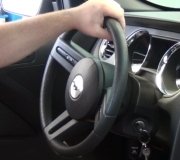About 2 years ago (at 72,000 miles) Meineke Car Care replaced the brake master cylinder (they had previously replaced the pads and a couple of rotors a few months before).
When I got the Jeep back the brake pedal was very spongy and the brake "travel" (where the brake engages when I hit the pedal) was about 1-2 inches lower than it was before they worked on it.
To make a very long story short, Meineke couldn't fix it, Goodyear Auto Service Center said they couldn't find anything wrong with the brakes and told me to take it to a Jeep dealer.
The local Jeep dealership has had my Jeep about 5 times. They have replaced the master cylinder two times, as well as other brake parts, bled the brakes several times, and finally gave up and said they can't figure out what the problem is.
A couple of months ago I took the Jeep to a transmission shop (the check engine light came on and the transmission was acting up. It turned out to be a sensor). When the mechanic drove the Jeep, he noticed how spongy the brakes were. I told him about all the problems I've had with them and he said he could fix it.
When I got the Jeep back, they had replaced the sensor in the transmission, but said they couldn't find anything wrong with the brakes. As soon as I drove out of the shop, there was a "clicking" noise coming from the left front wheel that stopped when I hit the brakes.
I had the mechanic drive it and he heard the noise. Later, he told me that I had a cracked rotor in the left REAR wheel. He replaced the rotor, and said that he bled the master cylinder but that still didn't fix the original problem, the spongy brakes.
About a week later, the very same "clicking" noise has returned. Not as loud as before, but it's getting louder.
I don't want to take the Jeep back to that shop and compain because I don't trust them anymore (they also stuck me with a $780.00 transmission bill for leaking seals).
I really like this Jeep and I'd like to drive it for a couple more years. But I always concerned about the spongy brakes, especially since I occasionally use it to pull a Haulmark trailer.
I'd appreciate any help I could get with this problem.
Thanks,
Al
Wednesday, July 4th, 2007 AT 10:15 AM


